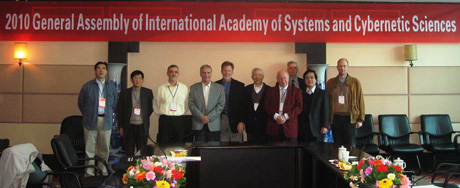On April 7, 2010 the International Academy of Systems and Cybernetic Sciences (IASCYS) was founded upon an initiative of the International Federation for Systems Research (IFSR). It is based in Vienna with IFSR.
While the traditional disciplines of science tend to have a restricted and narrow focus on their own particular specialized area, theories and practices in Systems and Cybernetics deal with a holistic and interdisciplinary worldwide viewpoint and thus attempt to span the gaps between individual (and often not cooperating) traditional sciences.
One of the main objectives of the Academy is to honour outstanding scientists in the field of Systems and Cybernetics and to build a platform of high-level interaction between them.
On October 25-27, 2010 the IASCYS held its first General Assembly together with a workshop conference at the University of Sichuan in Chengdu, China.
 First general assembly of the International Academy of Systems and Cybernetic Sciences.
First general assembly of the International Academy of Systems and Cybernetic Sciences.
The meeting confirmed the first 25 members of the Academy representing 14 countries on five continents (Argentina, Australia, Austria, Belgium, Canada, Chile, France, Great Britain, Ireland, Japan, Poland, China, Slovenia and USA).
In the course of the conference essential issues of System Sciences and Cybernetics were discussed from various points of view and future steps were considered, especially with respect to increasing the visibility of this important field.
The current Executive Committee of the IASCYS consists of Prof. M. Mulej, Slovenia (President), Prof. Jifa Gu, China (Vice-president), Prof. Ranulph Glanville, Great Britain, Vice-president), and Prof. Pierre Bricage, France (Secretary General).
More information: http://ifsr.ocg.at/world/node/68









